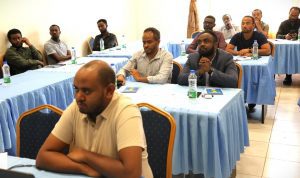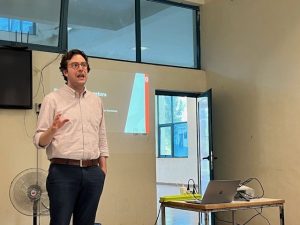
On Sept. 29 and 30, Dr. Kristin Long, associate professor in the Division of Endocrine Surgery and Vice Chair of Global Surgery, and Dr. Clayton Marcinak, general surgery resident, helped develop and present at the ACS H.O.P.E. Surgical Education Workshop in Hawassa, Ethiopia, the first teaching workshop of its kind in the country.
The UW–Madison Department of Surgery has a long-standing relationship with Hawassa University as part of the ACS H.O.P.E. consortium. This has led to many opportunities for collaboration, including surgical care and research workshops hosted in Hawassa.
“The next major area of focus … for continued professional development was in the realm of education,” Dr. Long said.
Hawassa University has a general surgery residency. Recently, several fellowship-trained specialty surgeons have joined the university, which has allowed them to expand what they can offer locally to their trainees. The goal of this education workshop was to further develop mechanisms for feedback and evaluation capacities at the university.

With support from the American College of Surgeons and Dr. Girma Tefera, professor in the Division of Vascular Surgery and Medical Director of the American College of Surgeons Health Outreach Program for Equity in Global Surgery (ACS H.O.P.E.), the workshop was organized for education leaders across many specialties at Hawassa University. There were faculty members from general surgery, neurosurgery, orthopedics, urology, OB-GYN, and some chief surgical residents.
When developing the itinerary for this workshop, Dr. Long and the other presenters, Drs. Kevin Pei and Beth Hochman, professors of surgery from NYU, worked closely with Dr. Zersenay Gebremeskel, the General Surgery Residency Program Director at Hawassa University Comprehensive Specialty Hospital (HUCSH). Together, they created an agenda that provided practical and useful information based on the current setup in Hawassa.
The agenda also included a session on the first day by Dr. Zersenay about the challenging scenarios that they face in the Hawassa setting. This allowed the presenters to tailor the second day agenda to ensure the topics could actually be implemented in Hawassa.
Dr. Long gave two presentations over the course of this two-day workshop.
“One of the talks I gave was about how to improve simulation training and how to come up with simulation projects that not only could help educate their trainees and give them more skill exposure outside of the OR, but also serve as education research projects for the faculty,” Dr. Long said. “They are working on building their academic portfolios and their research skills, so education-based research is a huge area.”
Following the presentation from Dr. Long, workshop participants worked in small, specialty-specific groups to identify a knowledge deficit in their trainees and created a plan on how to address it through simulation.
“The second day, we talked a little about entrustable professional activities, or EPAs, and how they could consider something like that in the future for ongoing micro-assessments of their residents,” Dr. Long said. “This was a way for them to learn about some of the newer things on the forefront of education.”

Dr. Marcinak also presented on the second day of the education workshop. He had spent the previous three weeks in Ethiopia as a part of his month-long, global surgery elective rotation. During this time, he observed how the residents and trainees are taught and how they teach other learners like the medical students. At the workshop, he presented about the role of residents as teachers. Based on his observations, he discussed how the surgeons and trainees at Hawassa University could think about education differently.
All of the presenters provided great insight into educational advances for Hawassa University.
“I think this lays the groundwork for future workshops,” Dr. Long said.
This education workshop was made possible due to the overall support from the ACS and the work Dr. Tefera has done with ACS H.O.P.E. ACS H.O.P.E. improves access to optimal surgical care for medically underserved communities through surgical service and education. It is committed to creating a global learning space that provides surgeons with opportunities to teach and learn from one another to better serve all patients and communities.